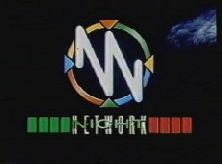By 1986 both the BBC and ITV had been given the go-ahead to fill their daytime schedules
with something a bit more substantial than schools programmes, horse racing and 1970s
Aussie soaps, a little like the so-called 'toddler's truce' nearly thirty years'
earlier.
A few local ITV stations dabbled with all night broadcasting in 1986 but it was London
Weekend who had the idea to have a single, three-hour show from 1 until 4 am, encompassing
lots of sub-programmes. What they came up with was more worthy than any daytime offering.
Night Network had been ably promoted in magazines like Q and was offered across the
whole ITV network. Paul Thompson was to be the regular host for the whole three-hour
show, but joined by hosts of the individual segments. The sports section was hosted
by Tom Watt (Lofty from EastEnders), a Desert Island Discs comedy knock-off The Bunker
Show hosted by Roland Rivron, an in-bed chat show Pillow Talk hosted by Emma Freud,
the Rap show hosted by Tim Westwood, new video clips were reviewed in Video View
with a guest panel, Chart Attack featuring the heavy metal and indie charts, quiz
show The Alphabet Show hosted by Nicholas Parsons, N Sign Radio with British rapper
Derek B, video clips from the fictional American station WTNN124, Leee's Place hosted
by Leee John from Imagination, repeats of popular sixties and seventies shows Batman,
The Monkees, The Beatles' cartoon series, The Partridge Family, Band History featuring
interviews, and occasional live sets in the studio or on stage with an audience.
It would also include an import, The Cutting Edge Happy Hour, a show originally produced
by IRS Records for MTV. Many of these items would be replaced in time by MBTV hosted
by Mick Brown, Pop Quiz, Auto TX, while The Bunker Show had been replaced with Rivron,
a show where host Roland Rivron interviewed his guest while both where floating in
the Thames.
Friday and Saturday would offer many of the above items, while Sunday would be given
over to network TV edited versions of concerts or video specials brought in from
other sources.
Despite the popularity of the show many ITV stations had dropped it after a year,
possibly with concerns about its failure to attract advertising. London Weekend would
then show the first hour on its own with the remaining ITV stations only broadcasting
from 2 until 4 am, while the Sunday show was dropped entirely.
When it came to an end ITV stations would provide viewers with their own regional
alternative, replaced later by teleshopping or bingo.

